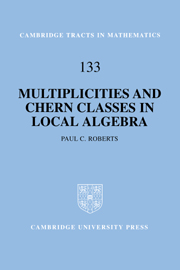9 - Chern Classes of Locally Free Sheaves
from Part Two - Chern Classes
Published online by Cambridge University Press: 29 September 2009
Summary
The purpose of this chapter is to define Chern classes of locally free sheaves on projective schemes. This theory will be used in the definition of local Chern characters of complexes in Chapter 11. We first define the concept of a sheaf on Proj(A), where A is a graded ring; we define a sheaf to be an equivalence class of graded A-modules, where two modules are equivalent when their restrictions to any open set of Proj(A) are the same (the precise definition is given in Section 1). This is not the usual definition of a sheaf, but the theory is essentially equivalent to that of quasi-coherent sheaves for projective schemes (see Hartshorne). This definition suffices for our purposes, and it makes it easy to prove the important facts that we need. We are particularly interested in locally free sheaves, for which it is possible to define certain intersection classes on the Chow group of Proj(A), called Chern classes, which in some sense measure how far the module is from being free. We describe the theory of Chern classes in this chapter and prove the functorial properties necessary for later applications. In the last section we define the push-forward of a sheaf by a projective map, which will be used in the proof of the local Riemann-Roch formula in Chapter 12.
- Type
- Chapter
- Information
- Multiplicities and Chern Classes in Local Algebra , pp. 177 - 206Publisher: Cambridge University PressPrint publication year: 1998



